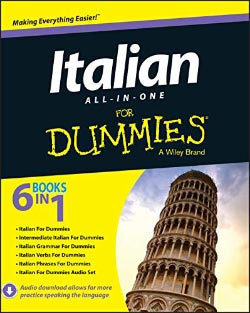As you probably already know (or you wouldn’t be here), there are two different ways to translate the verb to know into Italian: conoscere and sapere.
What’s the difference? How do you know when to use one over the other?
You have come to the right place. By the end of this lesson, you will have no doubts whatsoever about these two pesky little verbs. You will find plenty of examples and native audio recordings along the way.
All right, let’s see what the difference is between conoscere and sapere. Let’s get started! Iniziamo!
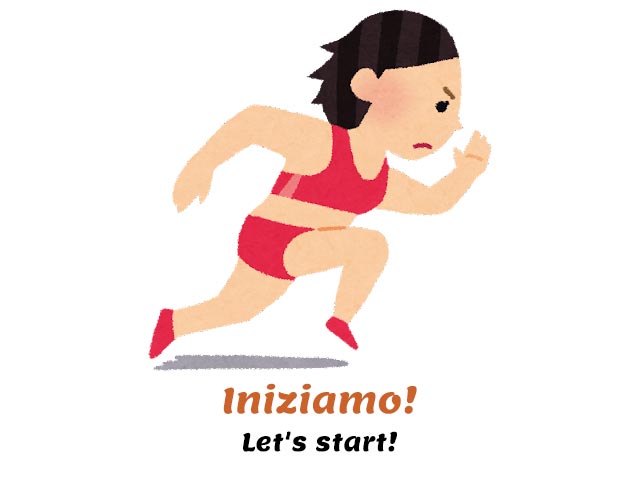
Difference between conoscere and sapere
As you will see in a moment, conoscere and sapere are not interchangeable. This is because they are used to address different kinds of knowledge. Let’s see why, starting with sapere.
Sapere
The main difference between sapere and conoscere is that sapere means to be able to [do something], or can. Let’s hear how it’s pronounced.
Sapere
To be able to, to know, can
Usage examples for sapere as “to be able to”
Sapere implies practical knowledge. It is often followed by an infinitive verb (the basic verb forms, ending in –are, –ere and –ire).
Saper scrivere
To know how to write
Saper fare di conto
To know how to count
Saper parlare
To know how to speak
Saper nuotare
To know how to swim

Potere or sapere?
If you want to translate to be able to do something, use sapere.
If you need to translate to be allowed to do something or a request to do something, use potere.
Sai suonare la chitarra?
Do you know how to play the guitar?
Puoi suonare la chitarra?
Can you play the guitar?
Mia nonna sa cucinare molto bene.
My grandma can (is able to) cook very well.
Mio figlio sa già scrivere il proprio nome.
My son is already able to write his own name.
Sai suonare il piano?
Can you play the piano?
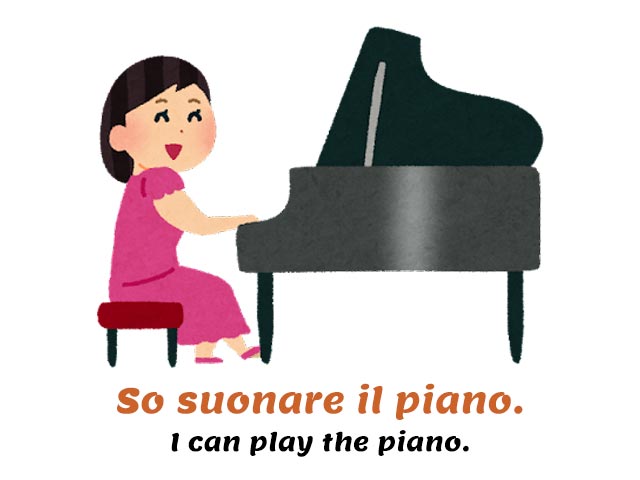
Usage examples for sapere as “to know some information”
A major difference between conoscere and sapere is that sapere can also be used to express specific theoretical knowledge.
So it can also mean to know [something], as in a piece of information or a fact. In this case, it is followed by a direct object.
Sai che ore sono?
Do you know what time it is?
So che Stefano è andato in biblioteca, ma non so quando tornerà.
I know that Stefano went to the library, but I don’t know when he will come back.
Sai se l’autobus delle tre è già passato?
Do you know if the three o’clock bus has already passed?
Sapete per caso quando apre l’edicola?
Do you happen to know when the newsstand opens?
Title: Italian All-in-One For Dummies
Language: English / Italian
Publisher: For Dummies
Pages: 672
Learn to speak Italian like a native? Easy.
Italian All-in-One For Dummies appeals to those readers looking for a comprehensive, all-encompassing guide to mastering the Italian language. It contains content from all For Dummies Italian language instruction titles, including Italian For Dummies, Intermediate Italian For Dummies, Italian Verbs For Dummies, Italian Phrases For Dummies, Italian Grammar For Dummies, and Italian For Dummies Audio Set.
Scusi, sa dove posso trovare una farmacia?
Excuse me, do you know where I can find a drugstore?
So che ieri sera Marta è andata da sola alla festa.
I know that Marta went to the party alone last night.
Tu non sai niente, Jon Snow.
You know nothing, Jon Snow.
(GoT fan here! 😉)
Non so come tu riesca a mangiare così velocemente.
I don’t know how you manage to eat so fast.
Mi annoio, non so cosa fare.
I’m bored, I don’t know what to do.
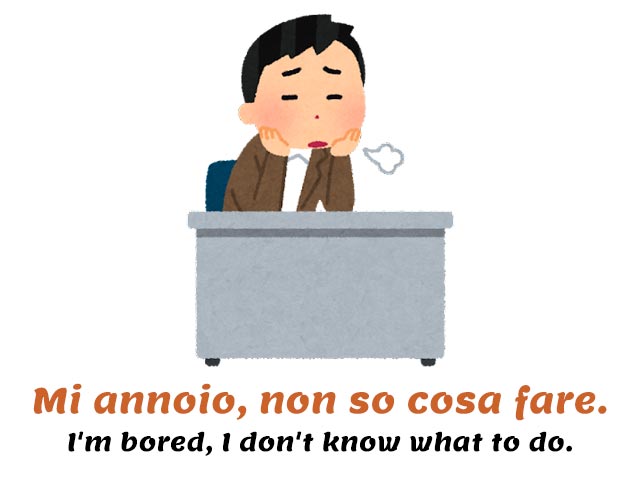
Sapere as in “have you heard…?”
Another difference between conoscere and sapere is that sapere can also be used to translate the English to hear in a very specific kind of sentence.
The English structure Have you heard…? is translated into Italian as Hai saputo che…?. Saputo is the past participle of sapere and it can be used as an adjective to describe an obnoxious know-it-all.
Hai saputo che Lorenzo si è rotto una gamba?
Did you hear that Lorenzo broke his leg?
Fare il saputo
To act like a smart aleck
Ho saputo che hai preso 100 all’esame. Complimenti!
I heard you got 100 on the exam. Congratulations!
Non fare tanto il saputo, non sapevi nulla dell’evento fino a due giorni fa.
Don’t you be such a know-it-all, you didn’t know anything about the event until two days ago.
Alessia è incinta? Da chi lo hai saputo?
Alessia is pregnant? Who told you this?
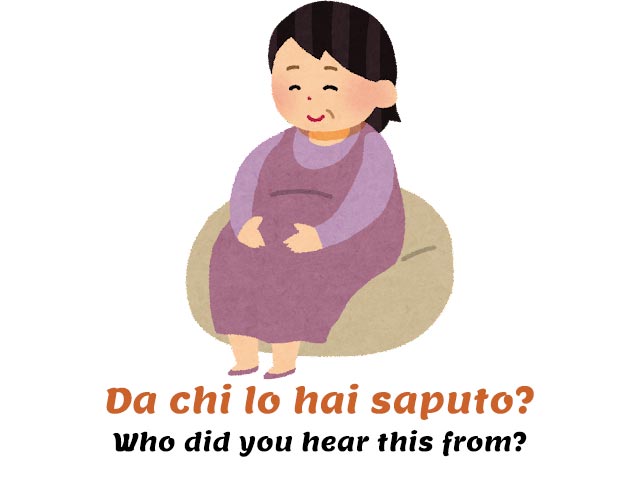
Sa di… sapere with tastes
Yet another difference between sapere and conoscere in Italian is that sapere can also be used to mean to taste, as in…
Questa torta sa di bruciato.
This cake tastes burnt.
Queste fragole non sanno di niente.
These strawberries don’t taste of anything.
Quest’acqua sa di plastica.
This water tastes like plastic.
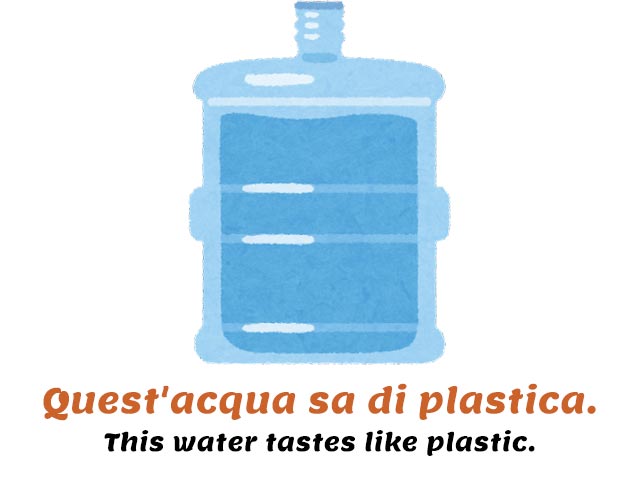
“Mi sa che…”
There’s a colloquial expression with the verb sapere that goes mi sa che… + a verb, roughly translating the English expression I feel like… in sentences like these:
Mi sa che andrà a piovere.
I feel like it’s going to rain.
Mi sa che Luca non verrà alla festa.
I guess Luca will not come to the party.
Mi sa che abbiamo perso il treno.
I think we missed the train.
This is only appropriate to use in informal situations.
Conoscere
If you have to quickly choose between conoscere and sapere, a good rule of thumb is that sapere is used strictly for things and to express knowledge, while conoscere is used mainly to express familiarity with people and places.
All right, let’s hear how conoscere is pronounced.
Conoscere
To know, to get to know

Usage examples for conoscere
Unlike sapere, conoscere is never followed by an infinitive verb. It is always followed by a noun. This is a big difference!
Like sapere, however, conoscere can be used to express theoretical knowledge, but mainly in-depth knowledge of something, be it a person, a certain topic or a place. In this case, it is followed by a direct object, like sapere.
Federico conosce bene il tedesco.
Federico knows German well.
Ho visto quel film così tante volte che lo conosco ormai a memoria.
I’ve seen that movie so many times that at this point I know it by heart.
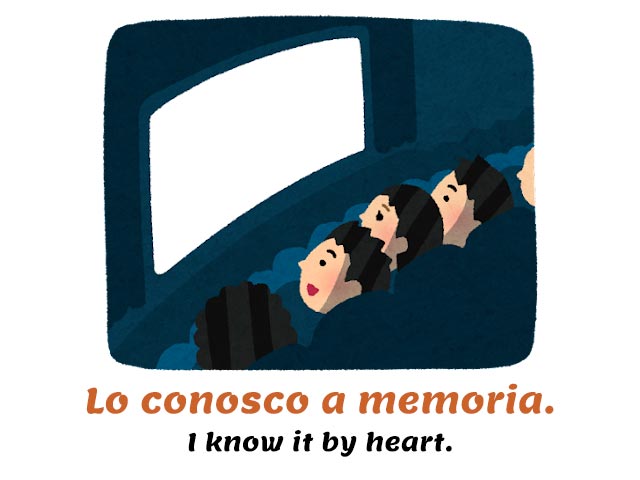
Nice to… know you!
Another difference between conoscere and sapere is that conoscere is used with the meaning of to know [someone]. Not something, but someone. Similarly, it can also mean to get to know [someone].
Conosci la madre di Marco?
Do you know Marco’s mother?
Ieri ho conosciuto tuo fratello.
I met your brother yesterday.
Knowing places
Yet another difference between conoscere and sapere in Italian is that conoscere is used to express your knowledge of geographical locations.
Dove siamo? Non conosco questa via.
Where are we? I don’t know this street.
Conosci bene Londra?
Do you know London well?
Non conosco questo posto.
I don’t know this place.
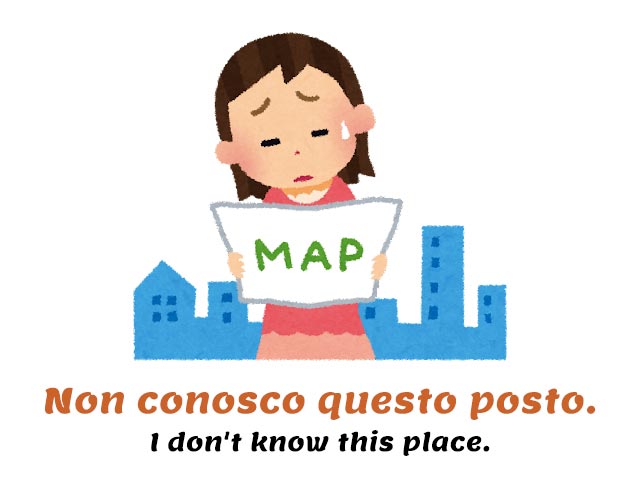
Before wrapping up our lesson, I’d like to show you some common expressions featuring conoscere and sapere in Italian. Let’s have a look at them!
Conoscere and sapere: Italian sayings with sapere
Saperci fare
To be skilled at doing something
Literally: To know to do
Per chi non lo sapesse
For the uninitiated
Literally: For those who didn’t know
Saperla lunga
To be knowledgeable, to think that one’s reasoning is better
Literally: To know it long
Saperne una più del diavolo
To know more tricks than a cartful of monkeys
Literally: To know one more than the devil
Conoscere and sapere: Italian sayings with conoscere
Ma chi ti conosce!
Am I supposed to know you?
Literally: But who knows you!
Una vecchia conoscenza
An old acquaintance, an old friend
Literally: An old knowledge
Conoscere i propri polli
To know someone or something so well that you can predict their behavior
Literally: To know one’s chickens

What next?
Now that you’ve seen the difference between conoscere and sapere in Italian, you might want to keep learning Italian online with these free Italian resources:
❤️ If you liked this lesson on the difference between conoscere and sapere in Italian, consider sharing it with your social media friends who are also studying Italian.


